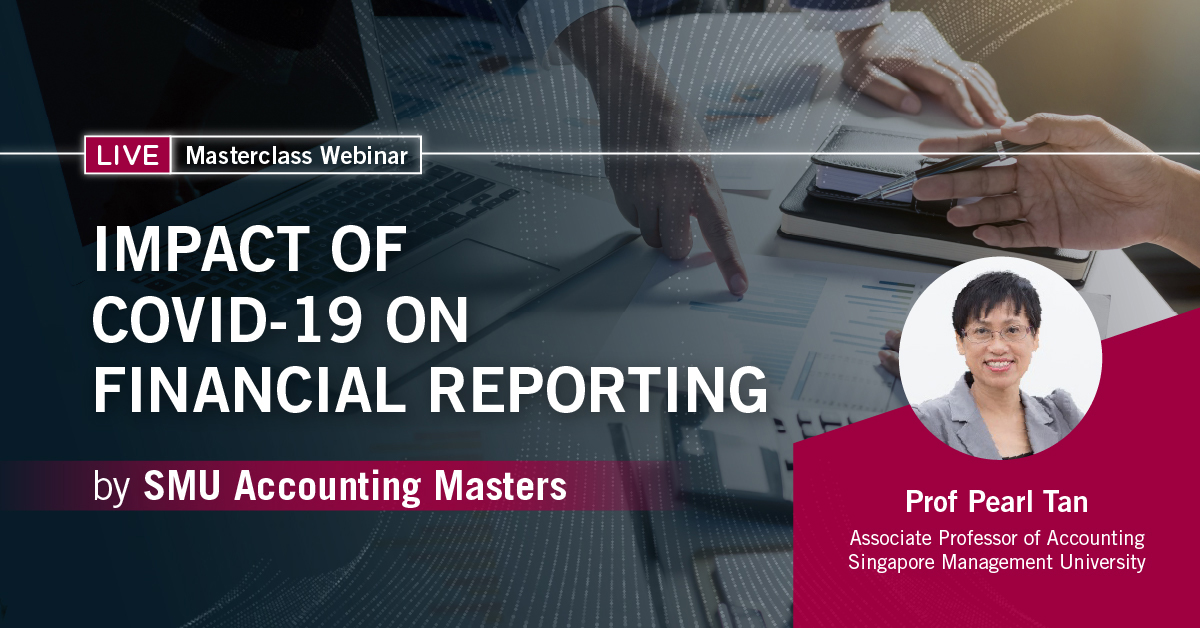Covid-19: Challenges in financial reporting
As the year draws to a close, year-end financial reports are set to shine a different light on the impact of Covid-19 on businesses in Singapore. Some rarely used requirements in accounting standards are brought to the forefront in financial reporting. Undoubtedly, economies the world over have been thrown off balance, as local businesses reel from the impact of the pandemic. Business models and strategies that were once seemingly fool proof and slated for success were forced to transform in order to survive, as the virus outbreak revealed its disruptive force globally.
Helping accountants here navigate the choppy waters of a new paradigm in financial reporting in these unprecedented times is Pearl Tan, Associate Professor (Education) in Accounting at SMU, in a recent Accounting Masterclass on the Impact of Covid-19 on Financial Reporting.
Sharing insight on some financial reporting areas that have been impacted as a result of Covid-19, such as going concern issues, lessee accounting, government grants, and impairment of assets, among others, Prof Tan pointed out that the International Financial Reporting Standards (IFRS) issued by the International Accounting Standards Board (IASB) are already in place to account for the financial reporting consequences of the pandemic. However, the impact of these standards is significant “because we never had a crisis of this scale”.
Starting with going concern issues, Prof Tan continued, “If Covid-19 has an impact on the going concern of a reporting entity then it has to be explicitly disclosed; typically it is the first footnote. There must be an expressed statement that the going concern basis is applied, notwithstanding that there may be some problems.”
Mitigating factors should also be disclosed, particularly to explain why a set of financial statements was prepared on a going concern basis, in spite of material uncertainty. Factors such as negotiations with banks, support from parent companies or proceeds from rights issue, among others, would need to be considered here, stated Prof Tan.
“In a worst-case scenario, if a company is not a going concern, that company cannot use historical cost accounting anymore. It will have to prepare the financial statements on a liquidation basis and all non-current liabilities will become current. There’s no long-term horizon in that sense. It’s a very sad situation, but unfortunately, that's a reality for a number of entities that were badly hit by Covid-19,” Prof Tan elaborated.
Lessees, which have been deeply affected by the outbreak with operations being disrupted and employees working from home, would also need to consider the economic incentives or disincentives on their renewal options, such as reduced lease terms. Complexity also arises from changes in rents that are pegged to a market index or rate, and uncertainty in expected payments on guarantees on residual values.
Prof Tan also noted that Covid-19 rent concessions voluntarily given by lessors would have an impact on lessee accounting.
“In the midst of the Covid-19 period, the IASB came up with an important amendment to allow for a practical expedient for lessees to not have to assess or account for such rent concessions as lease modifications. There are three conditions here. Firstly, the revised consideration must be less or equal to the consideration before the change, so there must be either a discount or equality to the previous consideration,” explained Prof Tan.
The reduction in payments would be due on or before 30 June 2021, in a bid to ensure that this is “more of a pandemic-related discount rather than something that goes beyond the pandemic”, and no substantive change to other terms and conditions is allowed.
For property tax rebate given by the Singapore Government to landlords, who then have a mandatory obligation to pass the rebates to the tenant in the form of a rental rebate, it raises the question of whether this rebate is a government grant or rent concession.
With respect to property tax rebates given by the Singapore Government in response to Covid-19, the Institute of Chartered Accountants of Singapore (ISCA) clarifies in the ISCA Financial Reporting Bulletin (FRB) 5 that “although the assistance to the tenant takes the form of a rental rebate, it is in substance a grant expense and not a reduction of rental income for the landlord … and is not a lease modification under SFRS (I) 16”. This again ensures that these changes are not extended post-Covid-19.
Still, for government grants, some key principles need to be met. These include recognising grant receivables when there is reasonable assurance that the reporting entity has met the requirements for such grants and the grants will be received.
Furthermore, the entity will need to recognise government grants in profit or loss on a systematic basis to match the expense from the related cost, for which the grants are intended to compensate, and not taken to income as and when received. And lastly, grants related to income are presented separately under, for instance, ‘other income’ or offset against the related expense with footnote disclosures.
Clearly, Covid-19 has steered the industry into a new paradigm, presenting new challenges in financial reporting. “We can’t really use the past to predict the future in Covid-19 because the past is based on a completely different paradigm, so what is normal now cannot be based on what we used to have, and it will take some time for us to figure out what’s normal,” Prof Tan said.





